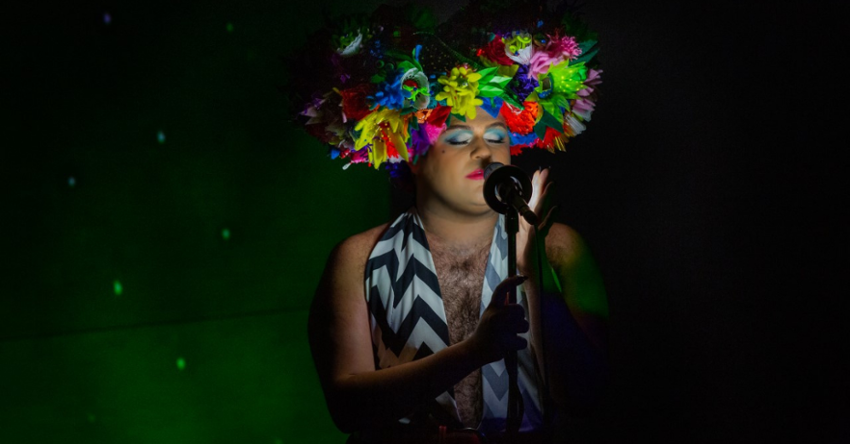VIEWPOINT: BEBE DELUXE ON DRAG AND COMMUNITY
June 22, 2021
BY MOCA STAFF

In celebration of Pride Month, MOCA Jacksonville hosted The Many Sides of Pride Film Festival presented by the LGBTQ Community Fund for Northeast Florida. The event took place throughout the first weekend of June and highlighted the extraordinary impact of the LGBTQ community on the world of cinema with film screenings and a series of programs featuring nationally renowned directors, regional organizations, and performers.
Dr. Nicholas de Villiers, a professor of English and film at University of North Florida, asked singer/songwriter/producer BeBe Deluxe a few questions about drag and community, as a recap to the program Unscripted: Let's Revue - Drag Queens in Conversation. The panel discussion featured local performers talking about the history and placement of Drag within Jacksonville and queer culture.
Nicholas de Villiers: What do you hope people take away from your Many Sides of Pride conversation about the history of drag in Jacksonville with the legendary Tonya Marie Richardson?
BeBe Deluxe: I hope that my conversation with Tonya brings clarity to the perspectives of queer people in marginalized spaces in real life, in application rather than in theory, in buzzword, in script.
N: I appreciated the connections you both made regarding overlapping communities, survival strategies, and support networks of drag queens, trans women, and sex workers, which we also saw in the festival screening of Mala Mala: A Transformative Documentary about these communities in Puerto Rico. Since your show Glitterbomb capped off the film festival with live drag numbers inspired by The Adventures of Priscilla, Queen of the Desert, could you talk about the films that have made their mark on your aesthetic or the Glitterbomb Show?
B: A lot of my personal aesthetic comes from high-concept musical comedy: Tank Girl, Spice World, Josie and the Pussycats, Little Shop of Horrors. Anything that really pushes into camp and self-reference while being pop-y and musical and about stage-wear-I'm sold!
N: For people who don't know about the Glitterbomb Show, which were your favorites?
B: I think the moment that Hayden [Palmer, husband and show director] and I are most proud of was the Night of a Thousand Joan Cusacks. We had always wanted to do it, but we thought Jacksonville was not ready-that's too niche, who wants that other than us? But after doing shows for about two years, we realized, oh, people just trust us. I liked [actress tributes] Streep Tease and Fakin' Whoopi. Our Nickelodeon-nostalgia shows are my favorite.
N: You've stated that you've retired from drag and are focusing on your music career. Could you talk a bit about that shift in your life and career?
B: I live the gender, so I don't feel like performing it anymore. This is a tough one because I don't dislike or disrespect the art of drag. I love it as a spectator, but so much of the art of drag gets lost in its commercialization. My music speaks for itself. I don't walk into the room and people are ticking off a box, oh, do you have a corset, nails, tights on? You don't look like the girls on TV. That doesn't exist in local music scenes. People inherently understand that music gets to be any and everything, but with drag it's very congealed and commodified. As much as I love the look, I enjoy writing and being a musician and making individual projects much more than I enjoy going into a bar and dancing and lip-synching to a song and taking money out of people's hands. I got through the trans stuff and now I have so much more energy. I can go to a social gathering and have my own unique sense of style and just be. In a room full of drag queens you're not going to notice me and I kind of like that. But music is great because it doesn't really matter what you look like or where you come from, people who appreciate music will appreciate what you are doing.
N: What about pairing your music with looks, like music videos? What has been your experience making music videos with Hayden?
B: I am a child of that early-2000s Pop bombast, so I think attaching an iconic look to music is just inherent, and that's why I'm appreciative of my drag background because it did teach me to find a character, niche, and brand. See: https://youtu.be/gEooXWHKEEA .
N: What advice do you have for those interested in getting into drag locally, either as a performer, or those who are searching out community and shows?
B: I did drag for 10 years because I was born putting on outfits. I was very queer. I was trans. I'm a performer. I went to school for theater. If you want to do drag because you want to be rich and famous that's a bad idea. But if you can't do anything else, then do it, because then you're perfect for it. If you want to do drag, get a couple of buddies, who are also queer, who support you and you feel safe with. Get ready together as a communal experience. Go out with them and see how you feel. People are going to ask for a picture and your Instagram. See if you like going out and talking to people when you're in drag. Make them remember your name. Look in places where drag is not being done (but ask yourself why-if it doesn't feel safe, don't do it). There are no rules. That TV show made it sound like there are rules.
N: What advice do you have for drag audiences, or for people who come up to someone who is dressed up and out with their friends?
B: If you are watching a drag show, act like you would at the symphony. You can applaud, hoot and holler. But do not run up on that stage. It is not a conversation or a duet. Theater etiquette. Some people have social anxiety and get too drunk and think they are the star of the show, but drag queens are not your babysitters or bouncers. Keep your hands to yourself. Don't make it about you. These performers literally have a spotlight on them for a reason. We have to walk around in places like Winn-Dixie, TJ Maxx, the beauty supply store, the Post Office, DMV, and CVS, with all kinds of anxiety because we have to watch our movements and make sure we are not dressed a certain way because there will be a problem. We understand that. We know it's not fair. That is why, when you come to watch drag queens perform, you will give them their attention and their respect deserved. Because the privilege you have of going into those spaces in the daytime without anxiety about there being a problem shows that you don't have the experience we do. It's not exclusively a straight thing-a lot of gay people forgot how to act.
N: Could you talk about your motivation behind creating Duval County Queer Pride?
B: Pride, at its essence, is about community getting together and celebrating their survival for another year, because, especially if you're trans, your survival is not guaranteed. It's thanking your community for pushing you forward. The number one tenet is entertainers are paid fairly. Highlighting and celebrating the police doesn't make sense when they make our lives difficult the rest of the year. It can just be community-funded and run. People can make fair wages. I think there's power in people. “DUUVAAAL” is the “Aloha” of people who live in Jacksonville, and “queer” is an umbrella term that covers a lot of people.
N: Where can people find you on social media and what projects do you have coming up that we can watch for?
B: You can find me on Instagram @bebe.deluxe. I've got Duval County Queer Pride on June 26th and just stay tuned, I've got some music coming out.
N: In the tradition of Andy Warhol's Interview magazine, what perfume are you wearing?
B: A combination of Nautica Voyage, Demeter Paperback, and Good Chemistry Brainiac.
→ WATCH UNSCRIPTED: LET'S REVUE - DRAG QUEENS IN CONVERSATION
